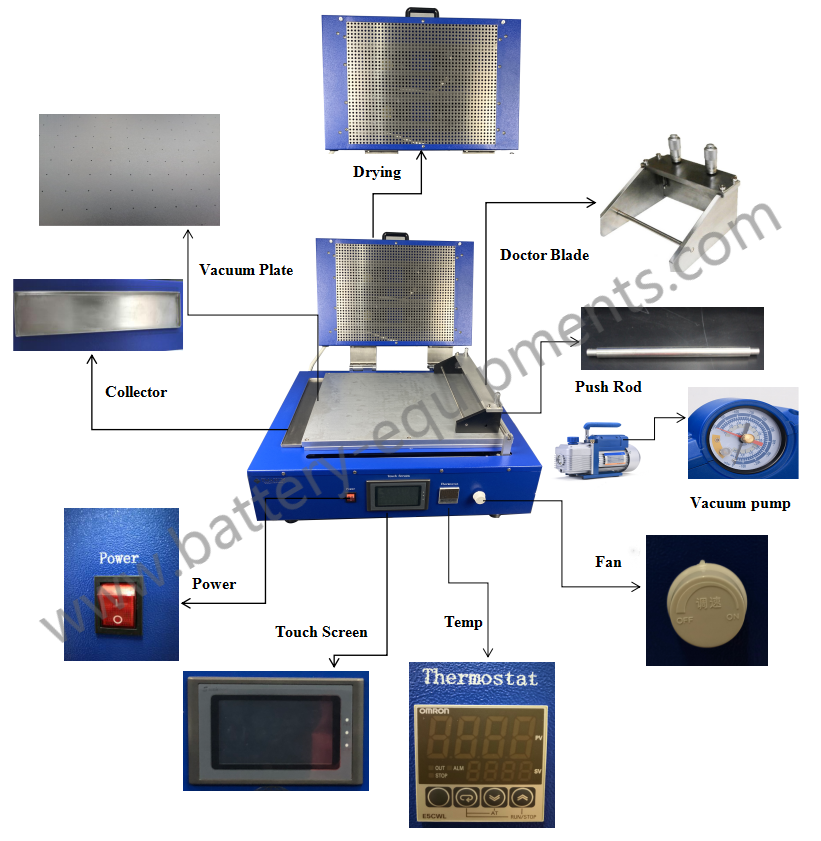- Battery Manufacturing Equipment
- Battery Laboratory Assembly Equipment
- Battery Pack Assembly Equipment
- Sodium Ion Battery Manufacturing Equipment
- Solid State Battery Assembly Line
- Dry Electrode Assembly Equipment
- Supercapacitor Assembly Equipment
- Perovskite Solar Cell Lab Equipment
- Li ion Battery Materials
- Ni / Al / Cu Metal Foam
- Customized Electrode
- Cathode Active Materials
- Anode Active Materials
- Coin Cell Parts
- Lithium Chip
- Cylindrical Cell Parts
- Battery Current Collectors
- Battery Conductive Materials
- Electrolyte
- Battery Binder
- Separator and Tape
- Aluminum Laminate Film
- Nickel Strip/Foil
- Battery Tabs
- Graphene Materials
- Cu / Al / Ni / Stainless steel Foil
- Battery Laboratory Equipment
- Li ion Battery Tester
- Battery Safety Tester
- Battery Material Tester
- Film Coating Machine
- Rolling Press Machine
- Electrode Mixer
- Coin Cell Crimping Machine
- Coin Cell Electrode Disc Punching
- Pouch Cell Sealing Machine
- Pouch Cell Stacking Machine
- Pouch Cell Forming Machine
- Pouch Cell Ultrasonic Welder
- Pouch Cell Electrode Die Cutter
- Cylinder Cell Sealing Machine
- Cylinder Cell Grooving Machine
- Electrode Slitting Machine
- Cylinder Cell Winding Machine
- Cylinder Cell Spot Welding Machine
- Electrolyte Filling
- Type Test Cell
- Other Battery Making Machine
- NMP Solvent Treatment System
- Vacuum Glove Box
- Lab Furnaces
- Ball Mill
- Hydraulic Press
- Laboratory Equipment
- 2024-03-20
A Lab Coating Machine is a specialized piece of equipment used in laboratory settings for applying thin and uniform coatings to various materials, such as films, substrates, or samples. In the context of battery research and development, lab coating machines are often used for applying electrode materials onto current collectors in the production of lithium-ion batteries. Here are key aspects and functionalities of a lab coater:
1. Precision Coating:
Lab coating machines are designed to provide precise control over the coating process. This precision is crucial for achieving consistent thickness and uniform distribution of electrode materials.
2. Adjustable Parameters:
These machines typically allow researchers to adjust various parameters such as coating speed, coating thickness, and drying conditions. This flexibility enables optimization for different materials and experimental conditions.
3. Slot Die or Doctor Blade Systems:
Lab coating machines may utilize different coating methods, including slot die coating or doctor blade coating. These methods offer specific advantages in terms of coating uniformity and control.
4. Substrate Handling:
Lab coating machines accommodate various types of substrates or current collectors. This versatility is essential for researchers working with different materials and configurations.
5. Drying Systems:
After the coating process, lab coating machines often include drying systems to remove solvents and solidify the coated material. Controlled drying conditions contribute to the quality of the coated films.
6. Uniformity and Consistency:
The primary goal of a film applicator coater is to achieve uniform and consistent coatings. This is crucial in battery research to ensure reproducibility and reliability of experimental results.
7. Containment and Safety Features:
Given that certain materials used in battery research can be hazardous, lab coating machines may include containment and safety features to prevent exposure and ensure a secure working environment.
8. Research and Development:
Lab coating machines play a vital role in the research and development of new electrode materials and battery technologies. Researchers can test different formulations and coating techniques on a small scale before scaling up to industrial processes.
9. Scale-Up Considerations:
Findings from lab-scale coating experiments are often used to inform scale-up processes in larger production facilities. Understanding the behavior of materials in a lab setting is critical for successful industrial production.
10. Versatility:
- Lab coating machines are versatile tools that can be used for a variety of applications beyond batteries, including coatings for solar cells, sensors, flexible electronics, and more.
In summary, a Lab Coating Machine is a fundamental tool in materials research, allowing for precise and controlled application of coatings. In the context of battery research, it facilitates the development and testing of electrode materials, contributing to advancements in energy storage technologies.
-
 Automatic Cylinderical Battery Electrode Winding Machine
Read More
Automatic Cylinderical Battery Electrode Winding Machine
Read More
-
 100-200L Double Planetary Vacuum Mixing Machine for Lithium Battery Slurry
Read More
100-200L Double Planetary Vacuum Mixing Machine for Lithium Battery Slurry
Read More
-
 Large Heating Roller Press Machine Calender For Li ion Battery Production Line
Read More
Large Heating Roller Press Machine Calender For Li ion Battery Production Line
Read More
-
 Large 3 Rollers Battery Electrode Film Intermittent Coating Machine for Pilot Production Line
Read More
Large 3 Rollers Battery Electrode Film Intermittent Coating Machine for Pilot Production Line
Read More
-
 512 Channel 5V3A Battery Grading Machine/Battery Charge Discharge Machine Tester
Read More
512 Channel 5V3A Battery Grading Machine/Battery Charge Discharge Machine Tester
Read More
 ru
ru


 cindy@tmaxcn.com
cindy@tmaxcn.com David@battery-equipments.com
David@battery-equipments.com Wechat:13506084915
Wechat:13506084915